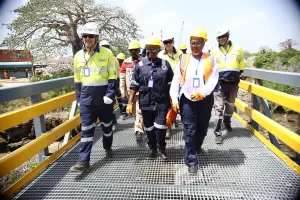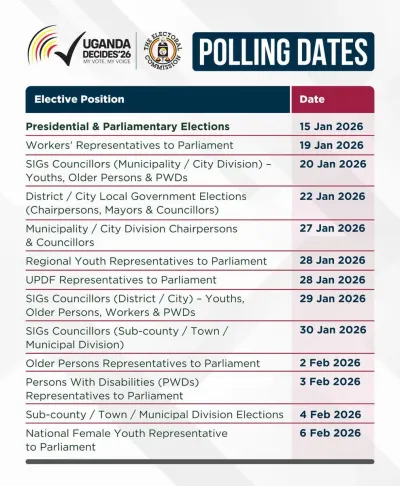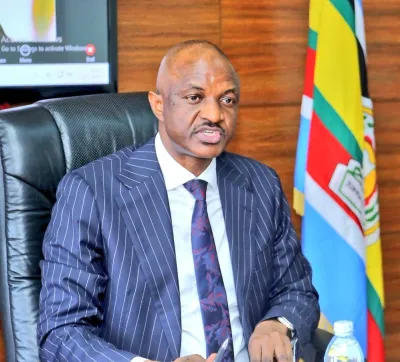
On television, Mr. President, amended the 1995 constitution to open the way for your endless presidency.
Mr. President, when you and your colleagues came here in 1986 you promised us a fundamental change. You also told us that you held a vision for Uganda — to transform our country from backward subsistence agriculture-based society to a modern country in 40 years. We embraced you and your vision for two decades. We also loved you so much because you sounded more reasonable and “visionary” than most of the past leaders and your opponents. We saw in you a Lee Kwan Yew, a Mahatir Mohamad, a Nelson Mandela, or Julius Nyerere.
However, over the years we have come to realize that you more of very wise man suffering from overconfidence and belief than a serious and visionary leader that you had earlier painted.
You have single-handedly condemned our country to random and haphazard projects including the politicisation of the expansion of districts and government, flawed growth doctrines based on free-trade, free-for-all democracy, Bonna Bagaggawale, to mention a few.
Take the example of making Uganda a fully “open” economy. Your government, specifically you in person, became a lead promoter of World Bank policies wholesomely as they are laid down in the Washington Consensus. In the process you have turned our country into a guinea-pig of sorts, hardly producing anything tangible but being a destination of all sorts of commodities the world economies would want to try out.
At the turn of the New Millennium, the World Bank published a list of top “globalisers” — countries that had topped the game of globalisation in the previous two decades. The top four countries on the list are China, India, Vietnam and Uganda, in that order.
The first three countries — China, India and Vietnam — were among the most heavily protected countries and they are the biggest beneficiaries of globalisation. Uganda, the only country among the top globalisers to have played by the rules of World Bank and IMF, and one that has always been “open” to international trade, did not benefit from globalisation. Actually it has been bypassed by globalisation.
According to World Bank data, of the four countries above, Uganda exercised the least trade barriers in the 1990s. Its average tariffs since 1990 to 2000 were 14.4 as compared to China’s 31.2, Vietnam’s 30 to 50, and India’s 50.5. But in the same decade Uganda’s 3% was the least average growth rate, as compared to China’s 7%, Vietnam’s 6% and India’s 4%.
China and Vietnam were not even members of the World Trade Organisation (WTO) –China became a member of WTO just yesterday, in 2005! Vietnam has not yet fully enrolled, their argument being that they cannot open up to “trade” when they have nothing to sell. Quite logical.
You can draw examples from wherever but one fact remains that countries that have benefited the most from globalisation are those that did not play by the orthodox rules. The countries most famous for rapid economic growth — the East Asian “Gang of Four”: Hong Kong, South Korea, Singapore, and Taiwan — all played the game of globalisation by unorthodox rules.
In 2004, a group of famous economists (including some on the liberal end of the spectrum like Paul Krugman and Nobel Prize winner Joseph Stiglitz) produced something called the Barcelona Development Agenda that announced: “There is no single set of policies that can be guaranteed to ignite sustained growth.” Three years later (in 2007), another Nobel laureate Robert Solow, known among the who-is-who economists of this generation as “the dean of growth research”, said: “In real life it is very hard to move the permanent growth rate; and when it happens…the source can be a bit mysterious even after the fact.”
A recent survey done by economists at Stanford University counted no fewer than 145 separate factors that had been found to be associated with economic growth. But most of these factors were found to be bogus, because they failed to hold up when other researchers tried to replicate them.
In his book, “False Economy”, published in April 2009, Alan Beattie (a legendary American economic journalist) accurately reflects the collapse in self-confidence among economists on their ability to usefully recommend how developing countries can rapidly develop. And he is right about the reasons for this: both success and failure have often caught economists by “surprise”.
Beattie narrates thus: Theological theorists of economic success traditionally alleged that being Protestant was the best thing for growth, (Max Weber once argued; just look at England and America). But then Catholic Ireland, Portugal, and Spain started growing faster than the Protestant countries! These theorists damned Confucianism, then praised it once East Asia started to grow. The religious determinists are still confused about whether Islam hinders growth, when Muslim success stories such as Malaysia consistently outperform Christian comparators such as the Philippines.
As for other factors, corruption has always been cited as a disaster in Africa, but apparently equal levels of corruption don’t seem to hurt East Asia. Beattie’s book is rife with interesting conundrums: the Nile river valley is one of the most fertile places on earth, yet Egypt imports half of its wheat; West Africa is the perfect location and climate to produce cocaine for Europe, but coke is instead made in distant Colombia — then routed through West Africa to Europe.
Mr President, in “Bad Samaritans”, Ha-Joon Chang picks on overconfident persons like you who think that your visions are the torch-handler for our lives. Like the cheerleaders of globalisation whom you have supported so much by promoting their “one-size-fits-all” policies: privatization, free trade, deregulation, etc, you seem to trust that your policies: big government, small districts; ring-fencing, Bonna Bagaggawale, civil militarisation, free-for-all democracy etc are the best for Uganda.
Well it is Abba Eban who said, “History teaches us that men and nations behave wisely once they have exhausted all other alternatives.” May be you are helping future leaders of this country to study a variety of alternative policies that work and don’t work. But in essence, time has revealed one important fact: visionary leaders are a myth!
How can a visionary leader preside over a country that imports over 82% of its consumables? We are importing toothpicks, fruit juices, toilet rolls, candle wax, bathing sponge (Ekyangwe)! Ours is the only country on earth with no mechanism for import surveillance. Yet it is under a visionary leader.
Your vision has also turned Uganda into a big casino! With unregulated markets, everyone who wants to make quick money comes to Uganda. Unregulated conglomerates are taking full advantage of your casino economics to reap excessive profits by over charging Ugandans. Gambling firms have set up Sports-betting points across the country where they extort money from unsuspecting youth. You can’t develop a country structured like ours














Ramathan Ggoobi
Ramathan Ggoobi is Policy Analyst, and Researcher. He lecturers economics at Makerere University Business School (MUBS) and has co-authored several studies on Uganda's economy. For the past ten years, he has published a weekly column 'Are You Listening Mr. President' in The Sunrise Newspaper, Uganda's Leading Weekly
Leave a Comment
Your email address will not be published.